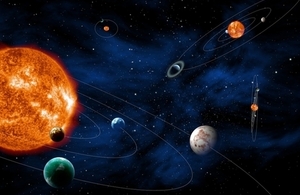Plato mission brings opportunities for UK space sector
A mission searching for habitable planets orbiting alien stars has been given the green light to move into the construction phase.

Searching for exoplanetary systems. Credit: ESA.
Plato (Planetary Transits and Oscillations of stars) was adopted at the European Space Agency’s Science Programme Committee meeting today (20 June 2017), following its selection in February 2014. That means work to build the science instrument payload can begin and in the coming months industry will be invited to bid to ESA for the contract to supply the spacecraft.
The UK Space Agency is investing £25 million in the development of the novel scientific instruments on board.
Dr Katherine Wright, Head of Space Science at the UK Space Agency, said:
Investment in Plato builds on UK science and engineering strengths in this area and secures us a leading role on this pre-eminent space science mission for the next decade. Plato has the exciting potential to discover Earth-like planets around other stars, which may eventually lead to the detection of extra-terrestrial life.
Planned to launch in 2026, Plato will monitor thousands of relatively bright stars over a large area of the sky, searching for tiny, regular dips in brightness as their planets cross in front of them, temporarily blocking out a small fraction of the starlight.
Astronomers have so far found over 1,000 planets beyond our Solar System (exoplanets), but none as yet has been shown to be truly Earth-like in terms of its size and distance from a Sun similar to our own.
Plato’s innovative design is set to change all that. Its suite of multiple small telescopes and cameras, reminiscent of the compound eye of an insect, will allow it to ‘stare’ at a large number of the nearest and brightest stars, with the aim of discovering Earth-sized planets orbiting Sun-like stars in the ‘habitable zone’ – the distance from the star where liquid water could exist at the surface.
This will allow them to be studied with unprecedented accuracy and assessed for their potential to host life. An important part of this investigation will be to perform an intricate study of the structure and properties of the host stars themselves, providing key complementary information needed for the proper characterisation of rocky Earth-like exoplanet worlds.
UK scientists and engineers in collaboration with the UK Space Agency are leading participants involved in all aspects of the mission. Prof Don Pollacco, of Warwick University, leads the Plato Science Management Consortium. Scientists and engineers at UCL’s Mullard Space Science Laboratory are responsible for the design and manufacture of the electronics for the camera system that sits behind the telescopes, and for characterising the camera detectors to optimise their performance.
The detectors are charge-coupled devices (CCDs), produced by the e2v company in Chelmsford under contract to ESA. A team of UK scientists, coordinated by Cambridge’s Institute of Astronomy, is also developing the Exoplanet Analysis data processing system on the ground.